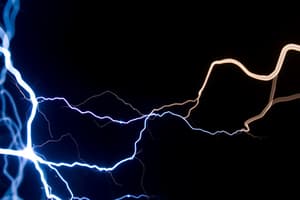Podcast
Questions and Answers
एक क्षेत्र में चार्ज का स्रोत गायब होता है, तो क्या होता है?
एक क्षेत्र में चार्ज का स्रोत गायब होता है, तो क्या होता है?
- इलेक्ट्रिक फ़ील्ड कम हो जाता है
- वहाँ का इलेक्ट्रिक फ़ील्ड बना रहता है
- इलेक्ट्रिक फ़ील्ड की मात्रा बढ़ जाती है
- वहाँ का इलेक्ट्रिक फ़ील्ड भी गायब हो जाता है (correct)
फैरेडे के कानून के अनुसार, किसे परिवर्तित करने में परिवर्तन में बिना संरक्षण सिद्धांतों का उल्लंघन किया जाता है?
फैरेडे के कानून के अनुसार, किसे परिवर्तित करने में परिवर्तन में बिना संरक्षण सिद्धांतों का उल्लंघन किया जाता है?
- समान्य समृद्धि
- इलेक्ट्रिक फ़ील्ड (correct)
- विद्युत ध्रुव
- मैग्नेटिक फ़ील्ड
कैसे कैपेसिटर आपूर्ति को संभालते हैं?
कैसे कैपेसिटर आपूर्ति को संभालते हैं?
- समाप्त (correct)
- कपोलिसियों
- मौन
- प्रकाश
सेमीकंडक्टर पदार्थों के चार्जर समृद्धि के कारण, संप्रेषक में पहुंचने पर कैसे संरक्षित की जाए?
सेमीकंडक्टर पदार्थों के चार्जर समृद्धि के कारण, संप्रेषक में पहुंचने पर कैसे संरक्षित की जाए?
मोबाइल फ़ोन और वायरलेस संचार किस पर निर्भर करते हैं?
मोबाइल फ़ोन और वायरलेस संचार किस पर निर्भर करते हैं?
विद्युत क्षेत्र किसे कहते हैं?
विद्युत क्षेत्र किसे कहते हैं?
विद्युत क्षेत्र की गुणधर्मों में से एक है
विद्युत क्षेत्र की गुणधर्मों में से एक है
किन चार्जों से विद्युत क्षेत्र की श्रेणी शुरू होती है?
किन चार्जों से विद्युत क्षेत्र की श्रेणी शुरू होती है?
विद्युत क्षेत्र कैसे मूल्यांकन किया जा सकता है?
विद्युत क्षेत्र कैसे मूल्यांकन किया जा सकता है?
विद्युत क्षेत्र में कौन-सी संपत्ति होती है?
विद्युत क्षेत्र में कौन-सी संपत्ति होती है?
Flashcards are hidden until you start studying
Study Notes
Exploring Electrostatic Physics: Understanding the Electric Field
At the heart of understanding electrostatic phenomena lies the electric field — a fundamental concept within the realm of electromagnetism. In this piece, we'll delve into what the electric field is, how it arises from charged particles, its properties, and some key applications.
What Is an Electric Field?
An electric field surrounds any charge distribution. It's visualized as a region where forces act upon other charges placed therein, like the force between two magnets. Mathematically speaking, the electric field is defined by the vector Coulomb's law or alternatively by Gauss's Law, both of which relate electric fields to their cause—charge distributions.
Charge Distribution and Electric Field Generation
When a charged particle resides in space, it exerts a force on nearby uncharged particles, causing them to move if left free. This bulk movement of particles gives rise to an electric field, with lines of force tracing the direction of these forces. Lines of force always originate from positive charges and terminate at negative ones.
Properties of Electric Fields
Linearity: Superposition applies here; the net effect of multiple sources is simply the summation of individual effects they would have independently, assuming linearity remains intact.
Continuity: If the source of charge disappears from a certain location, the electric field does too, and vice versa when new charge appears at the spot.
Conservation of energy: According to Faraday's law and Ohm's Law, changing magnetic fields and applied voltages induce changes in electric fields. These changes occur without violating conservation principles.
Applications of Electric Field Concepts
-
Electrical devices such as transistors and diodes function based on the electric field present around semiconductor materials due to the spatial variation of carrier concentrations.
-
Capacitors store electrical potential energy through electric displacement over two plates separated by an insulator. As electric charge accumulates at one plate, an opposite charge builds up on the other side, leading to a buildup of electric field strength. When disconnected, the capacitor releases stored energy and maintains current flow until exhausted.
-
Mobile phones and wireless communication rely heavily on modulating radio waves to encode information signals, which travel as an oscillatory electric field component in vacuum or air.
As you can see, our everyday interactions with technology often involve the fundamental concepts of electrostatics embedded deep within their working mechanisms. Now you know more about electric fields and their significance, I hope your appreciation for these invisible forces has grown!
Studying That Suits You
Use AI to generate personalized quizzes and flashcards to suit your learning preferences.





